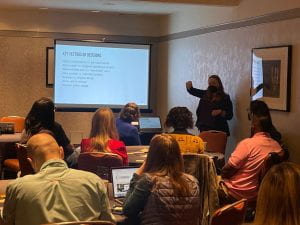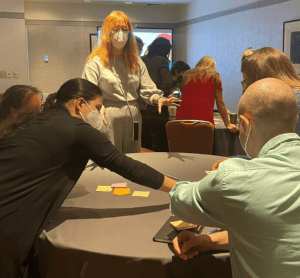Introduction
The goal of this special issue is to highlight the growing focus on teaching user experience (UX) in technical and professional courses and programs. We are soliciting articles for a special issue of Communication Design Quarterly that present stories from the classroom to create a shared understanding of the breadth and diversity of how UX is taught in TPC. We seek research articles illustrating theoretical and applied discussions of teaching UX, and experience reports or teaching cases that share how UX is implemented in assignments, activities, and assessments. We are especially interested in work that highlights the opportunities to connect UX and social justice within TPC programs.
User experience (UX) has a long intertwined history with technical and professional communication (TPC) (Redish, 2010; Redish & Barnum, 2011; Rose & Schreiber, 2021). However, UX is an interdisciplinary field that draws from computer science, psychology, anthropology, among others (Redish, 2010). While the field of UX is interdisciplinary, most academic programs are not. Given the growth of the field of UX and the interest from newcomers attempting to enter the field, there are many opportunities and options for people to learn about UX. These opportunities occur both within and outside of the academy, including at for-profit bootcamps that students can take in addition to or in lieu of bachelors or masters programs. This growing interest in UX is an opportunity for TPC programs to reflect and share their approaches to teaching UX that center social justice as a key theoretical framework (Haas & Eble, 2018). Instructors who teach in fields related to communication design teach UX in unique and innovative ways.
Description and literature review
We define UX as: an interdisciplinary professional practice and field, an iterative process, an outcome with material impacts (Buley, 2013; Turner & Rose, 2021). We distinguish the larger practice of UX as different from the method of usability (Rose & Turner, forthcoming). While there is emerging research of how UX is taught in TPC programs (Turner & Rose, 2022), the field needs more work looking at exactly how TPC instructors enact their pedagogical goals and methods within the classroom (Shivers-McNair et al., 2018; Tham 2021). A key component of UX pedagogy is providing opportunities for students to grapple with this complexity and practice based struggles of UX (Scott 2008, Chong 2012, Rose & Tenenberg 2017). Working in UX is rhetorically a complex endeavor with a variety of communication goals and audiences (McDonald, Rose, & Putnam 2021).
Similarly to the larger social justice turn in the field of TPC (Walton et al., 2019), there are opportunities to disrupt and question the industry-centric perspectives to UX (Rose et al., 2018) and explore broader contexts for user advocacy (Acharya, 2018, 2022). Critical to UX pedagogy in TPC is the need to decenter whiteness and engage Black experiences and expertise in UX. As defined by the CCCC Black Technical and Professional Communication Position Statement with Resource Guide (Mckoy et al., 2020):
User experience design from the perspective of Black TPC taps into Molefi K. Asante’s concept of Afrocentricity by placing the suppressed histories and experiences of the Black Diaspora at the center of evaluating the social, economic, and political aspects of design. These perspectives are driven by practitioners (rather than scholars) of technical and professional communication who push against the marginalization of Black lived experiences in design thinking. Their perspectives encourage us to consider design as it positively impacts and emerges from the needs of the Black community.
We resist techno-centric definitions of UX that perpetuate white supremacist logics of expediency (Jones, 2016) that maintains the status quo.
Previous research has shown that instructors from TPC programs can and do teach UX in interesting and nuanced ways that are highly variable and flexible (Turner and Rose 2022). However, evidence from this study also highlights how TPC instructors are often UX teams of one and sometimes experience feelings of inadequacy or imposter syndrome due to a lack of training in teaching UX or having industry experience in UX (Turner and Rose 2022). This finding echoes previous work that highlights that instructors do not receive preparation in their graduate programs and feel underprepared to teach topics such as usability (Chong, 2012) and current TPC textbooks do not fully cover these topics (Chong, 2015).
In this special issue, we are interested in highlighting the expertise and practices of instructors by showcasing their innovative approaches to teaching UX to students and designing UX programs. We are not referring to the ways students experience curricular materials, for example, the usability of a syllabus or thinking of students as co-creators of academic products (Bartolotta et al., 2017; Brizee et al., 2012; Crane & Cargile Cook, 2022; Opel & Rhodes, 2018). While that scholarship is needed, it is outside of the scope of this special issue.
We are seeking research articles that illustrate theoretical and applied discussions of teaching UX, and experience reports in the form of teaching cases with pedagogical approaches about how to design, scaffold, and implement UX assignments, activities, and assessments. We are especially interested in work that highlights the opportunities to connect UX and social justice within TPC programs. For experience reports, we envision that authors would propose a teaching case and submit instructional material that can be peer reviewed and, if accepted, published in the ACM Digital Library.
Possible Topics for this Special Issue
The guest editors invite proposals for original research papers and experience reports that address issues such as, but not exclusively, the following topics:
-
- Anti-racist pedagogies in UX
- Community-engaged UX
- Critical UX
- Engaging with the complexity of UX in the classroom
- Interdisciplinary collaborations within and beyond the academy
- Programmatic reimaginings to incorporate a focus on UX
- Reimagining the TPC service course in conversation with UX
- Rhetorical approaches to teaching UX
- Social justice approaches to teaching UX
Submission Guidelines
Proposals should be up to 500 words in length (not including references) and sent as an email attachment in .docx format to ejrose@uw.edu. All proposals should include the submitter name, affiliation, and email address as well as a working title for the proposed article.
Please include in your proposal the following information:
-
- Type of proposed article: original research or experience report.
- Connection to CFP: how does the proposal align with the overall aims of this special issue?
- Specific topic as it relates to UX: what specific aspect of UX Pedagogy would the proposed article discuss?
- Method of discussion: how would the proposed article go about addressing this specific topic (i.e., report of empirical research, experience report/teaching case)?
- Curricular materials: What curricular materials, if any, would the author provide (syllabus, assignment details, program descriptions)?
- Reader takeaway: what specific knowledge would a reader of the proposed article gain by reading it? How would other instructors or program administrators benefit from the proposed article?
Production Schedule
The schedule for the special issue is as follows:
-
- September 15, 2023 – Proposals due
- October 15, 2023 – Guest editors return proposal decisions to submitters
- January 15, 2023 – Draft manuscripts of accepted proposals due
- March 1, 2024 – Feedback from reviewers to authors
- June 1, 2024 – Final manuscripts due
- Fall 2024 – Publication date of special issue
Contact information
Completed proposals or questions about either proposal topics or this special issue should be sent to Emma J. Rose (ejrose@uw.edu) and/or Heather Noel Turner (hturner@scu.edu)
References
Jones, N. N. (2016). The technical communicator as advocate: Integrating a social justice approach in technical communication. Journal of Technical Writing and Communication, 46(3), 342-361.
Acharya, K. R. (2018). Usability for user empowerment: Promoting social justice and human rights through localized UX design. SIGDOC 2018 – 36th ACM International Conference on the Design of Communication. https://doi.org/10.1145/3233756.3233960
Acharya, K. R. (2022). Promoting Social Justice Through Usability in Technical Communication: An Integrative Literature Review. Technical Communication, 69(1), 6–26. https://doi.org/10.55177/tc584938
Bartolotta, J., Bourelle, T., & Newmark, J. (2017). Revising the Online Classroom: Usability Testing for Training Online Technical Communication Instructors. Technical Communication Quarterly, 26(3), 287–299. https://doi.org/10.1080/10572252.2017.1339495
Brizee, A., Sousa, M., & Driscoll, D. L. (2012). Writing Centers and Students with Disabilities: The User-centered Approach, Participatory Design, and Empirical Research as Collaborative Methodologies. Computers and Composition, 29(4), 341–366. https://doi.org/10.1016/j.compcom.2012.10.003
Chong, F. (2012). Teaching usability in a technical communication classroom: Developing competencies to user-test and communicate with an international audience. 2012 IEEE International Professional Communication Conference, 1–4.
Chong, F. (2015). The Pedagogy of Usability: An Analysis of Technical Communication Textbooks, Anthologies, and Course Syllabi and Descriptions. Technical Communication Quarterly, 25(1), 12–28.
Crane, K., & Cargile Cook, K. (2022). User Experience as Innovative Academic Practice. WAC Clearinghouse, University Press of Colorado. https://doi.org/10.37514/TPC-B.2022.1367
Haas, A. M., & Eble, M. F. (2018). Key Theoretical Frameworks: Teaching Technical Communication in the Twenty-First Century. University Press of Colorado.
Mckoy, T., Shelton, C., Sackey, D. J., Jones, N. N., Wourman, J., & Harper, K. C. (2020, October 5). CCCC Black Technical and Professional Communication Position Statement with Resource Guide. Conference on College Composition and Communication. https://cccc.ncte.org/cccc/black-technical-professional-communication/
Opel, D. S., & Rhodes, J. (2018). Beyond Student as User: Rhetoric, Multimodality, and User-Centered Design. Computers and Composition, 49, 71–81. https://doi.org/10.1016/j.compcom.2018.05.008
Redish, J. (2010). Technical Communication and Usability: Intertwined Strands and Mutual Influences. IEEE Transactions on Professional Communication, 53(3), 191–201.
Redish, J. G., & Barnum, C. (2011). Overlap, Influence, Intertwining: The Interplay of UX and Technical Communication. Journal of Usability Studies, 6(3). http://dl.acm.org/citation.cfm?id=2007456.2007457&coll=DL&dl=GUIDE&CFID=476800970&CFTOKEN=85764636
Rose, E. J., Edenfield, A., Walton, R., Gonzales, L., McNair, A. S., Zhvotovska, T., Jones, N., de Mueller, G. I. G., & Moore, K. (2018). Social Justice in UX. 1–2. https://doi.org/10.1145/3233756.3233931
Rose, E. J., & Schreiber, J. (2021). User Experience and Technical Communication: Beyond Intertwining. Journal of Technical Writing and Communication, 51(4), 343–349. https://doi.org/10.1177/00472816211044497
Shivers-McNair, A., Phillips, J., Campbell, A., Mai, H. H., Yan, A., Macy, J. F., … & Guan, Y. (2018). User-centered design in and beyond the classroom: Toward an accountable practice. Computers and Composition, 49, 36-47.
Tham, J. (2021). Design thinking in technical communication: Solving problems through making and collaboration. Routledge.
Turner, H. N., & Rose, E. J. (2022). What do We Teach When We Say We Teach UX? A Study of the Practices of TPC Instructors. Programmatic Perspectives, 13(1), 61–102.
Walton, R., Moore, K., & Jones, N. (2019). Technical Communication After the Social Justice Turn: Building Coalitions for Action. Routledge.





